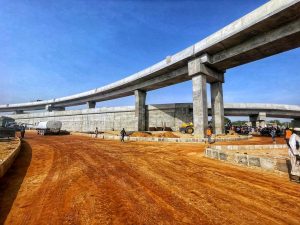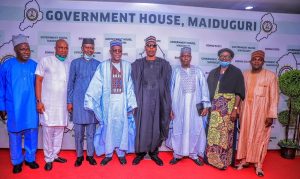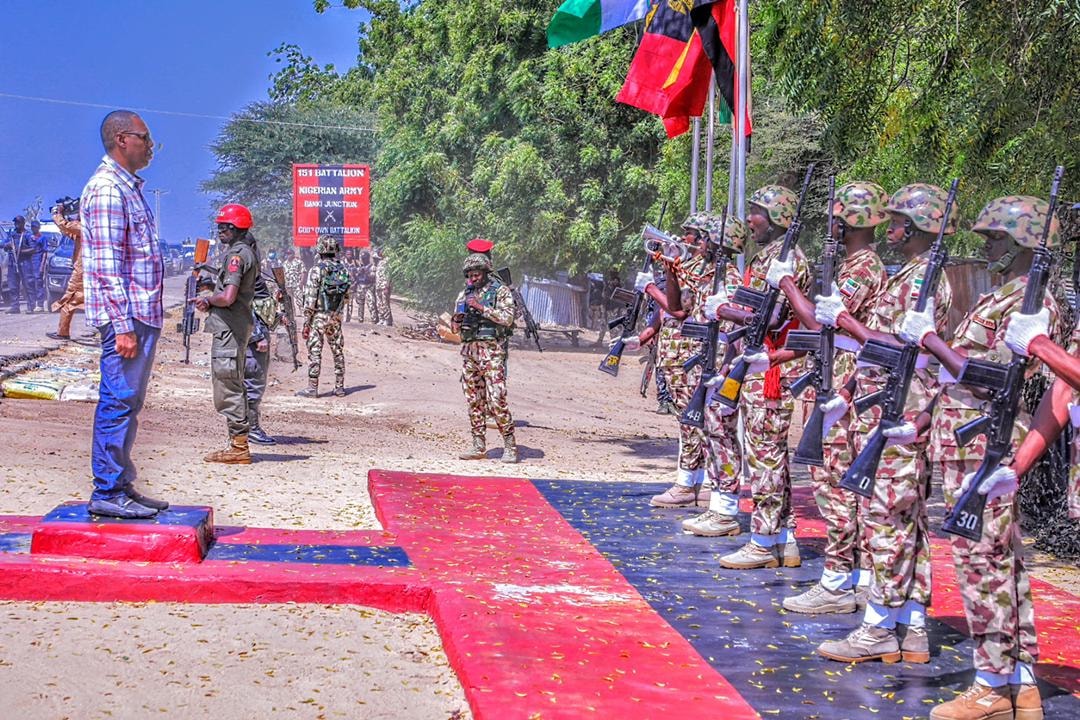By Ambassador Usman Sarki
This essay intends to assess the current leadership in Borno State of Nigeria, where unsettling events have been going on for twelve years or so, which when applied to a country, could warrant it being classified as a “failed state”. This notion of “failing” is unavoidably associated with the disruption of the vital essences of the country so classified including its institutions of state, the administration of justice, the conduct of government and its capacity for effective and efficient delivery of services, etc. In Borno State, even at the very height of the Boko Haram terrorist insurgency, the functions of the government were conducted to a reasonable extent albeit under a climate of distressing and overwhelming uncertainties and challenges of debilitating underdevelopment, mismanaged opportunities and badly aligned policies and programmes.

A symbol of development?
This essay turns out to then be about the dexterous deployment and use of power as a tool for achieving the ends of progressive transformation of a given society. In this case, we are writing about Borno State of Nigeria under the leadership of Professor Babagana Umara Zulum, (mni). Many Nigerians and indeed outside observers see him as a phenomenon of spontaneous combustion that flared up unexpectedly on the Nigerian political scene. Spontaneity in looking at our surroundings and assessing things with relentless importunity can, in fact, be powerful inspirations for embarking on a discourse about change. In noting and acknowledging the state of things in any given society, there should be no furtive references or surreptitious and grudging acceptance of realities either negative or positive, but the affirmative rendition of the unvarnished truth whenever and wherever possible.
This detached and disinterested judgment may be seen as cold and deliberately nonpartisan, it is, however, necessary that we should adopt this posture of critical indifference and impartiality when discussing the actions of a leader seated in the crucible of power.
There are the intersecting issues that governance in the state today must address and consequently ameliorate by adopting policies and programmes that are aligned with established parameters of administration elsewhere and imbibing of best practices in key sectors of human development. The mix of power and leadership and their appropriate application in the management of states and societies generate the momentum towards change, which is the only factor that governance should be concerned with. Change in the sense of alteration of the circumstances and situations of people from one state to a higher level of development, is in fact what leadership should focus itself on. It is against this background that we intend to examine the situation in Borno State of Nigeria to determine how the state has fared so far in the last two years under the leadership of Professor Babagana Umara Zulum, mni.

Inclusivity as answer?
Much as there is a palpable sense of “not yet being out of the woods” so to speak, there is also the irrepressible feeling that the dangerous and precarious afflictions of the state that have lasted near twelve years are behind us. This sense of relief and unconcern about momentary dangers can be observed everywhere in Maiduguri, the state capital. Where once daily routines of existence were interrupted by sporadic violence and malicious misadventures of Boko Haram, today a sense of return to normalcy and a general sigh of relief permeate the air. Where once the people of Maiduguri lived with the air of death around them expecting violent and sudden end at any moment, today this sense of looming danger and terminal misery seems to have abated to a large extent. Today, the casual observer of the situation in Maiduguri can readily discover that peace has returned to the state, and that the people are picking up the shattered pieces of their existence after twelve years of Boko Haram’s blind malice and indiscriminate attacks against all things that stood in their way.
In Maiduguri today, we can see the inhabitants moving about with such freedom and abandon that it is difficult to tell if the state had actually gone through those terrible moments of egregious violence and mindless destruction and bloodshed. Where once the sounds of exploding bombs, improvised devices and the rattle of automatic weapons rented the air, today the noise that welcomes visitors and residents alike is the unceasing and pulsating sounds of beneficial employments and the pursuit of innocent livelihoods. How came such a change in the fortunes of the state can be attributed to Divine Providence and the exertions of the leadership of the state especially the untiring and sometimes obstinate determination of the governor, Professor Babagana Umara Zulum. This fact has been acknowledged even by non-indigenes of the state. The fact that the governor has been on top of the situation in the state demonstrates his commitment to salvaging the people’s fortunes and restoring their lost hopes.
This sense of urgent rectification and a feeling of lost years to recover, seem to preponderate in the calculations of the state’s leadership in terms of establishing benchmarks for resuscitation of the fortunes of Borno. The deployment of power therefore, is aimed at achieving a retreat from the precipice and repositioning the state towards a situation of normalcy and demonstrable security. After all, when all is said and done, security and the attainment of perpetual peace should underpin the entire philosophy of governance in a post-conflict society such as Borno. The intersection of violence and unrest at one point that has lingered on for upwards of a dozen years, must have a telling effect on the psyche and temperament of any people no matter how hardy such people might be. Vulnerability created by mismanagement of opportunities and absence of foresight has been the bane of the state for quite sometime. However, since 2019, this sense of hopelessness has been reversed to a large extent by the determination and perseverance of Governor Zulum who has decided to lead from the front and allow the backseat to be taken by his subordinates in government.
This combination of dynamic posture and perceptive deliverance of key elements of governance have replaced the affected nonchalance that has been the malaise and misfortune of the state during several years. Management when not accompanied by selective attention towards priorities and decisive goals, merely translates to action without motive or end results. That to my mind, was what Joseph Conrad meant when he wrote of the futility of precision without force. This idea of force dutifully deployed towards the positive attainment of some predetermined objectives, seems to be the driving impulse behind the Zulum administration in Borno State. The bewildering array of challenges that have afflicted Borno State must at one point or the other prove a disconcerting phenomenon for the government and people of the state that should actually lead to a loss of hope and confidence as to the amelioration and rectification of their conditions. However, resilience as shown by the people and intrepid courage as exhibited by Governor Zulum, have in fact served to pull the state from the brink of total destruction and all-consuming danger.
After the passing of the state’s development budget for the fiscal year 2022, the focus of the government now is on creating the critical mass of projects and deliverable programmes that would ultimately translate into the attainment of what has so facilely been termed as sustainable development. The projects and deliverables that the budget anticipates form the sum total of the activities that Governor Zulum had been contemplating and experimenting with over the last two years. In a sense therefore, the 2022 budget is a vehicle of consolidation before the terminal year of his first term in office would be reached in 2023 God willing. Herein lies the urgent desire to anticipate the inexorable march of time, and defeat the inveterate enemy of progress which is lethargy. This urgent sense of unaccomplished work is what seems to impel the Governor to plunge headlong into the apparently dangerous waters of experimentation with the revolutionary style of leadership with which he is now associated.
It is not enough simply to provide water and sanitation, power and roads and other tangible elements of development to a state or a people. What matters in the end is how these are delivered. The veracity of intent and the transparency of the deeds count as much as the fact of delivering the services that we have mentioned. Herein lies the difference in the style of Governor Zulum, where there are no pretenses or hidden agendas to be uncovered. What we see is the unvarnished truth as I wrote earlier, that is heavily laden with empathy and consideration for the people’s well-being. Governance in the Zulum era means serving the people in the true sense of the word. It is not about condescending indifference or a grudging outreach to meet the people’s hopes and expectations. On the contrary, the Zulum era signifies the striving to meet the people’s expectations as a matter of their right and entitlement, and the awareness on the part of the leader that he is doing what he swore to do when he took office.
In Borno today, the revolution that is sweeping the state is not a hurricane but a benevolent wind of change that is pregnant with all sorts of possibilities and new realities. This matter-of-fact situation is now seen by the people of the state as a right and an entitlement, while the leadership sees its role as a midwife that is about to safely deliver the promises that it made to the people in accepting their endorsement and trust on coming into power. Power in Borno today is not an edification of an individual as it used to be the case. It is now actually an ingredient of development that is being prudently deployed to serve certain ends that are largely predicated on the people’s expectations to live in perpetual peace and assured conditions of dignity and development.




























